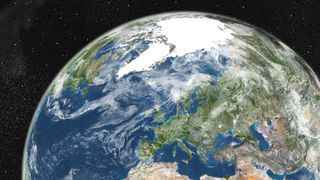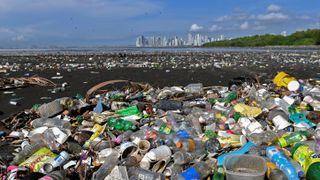Earth Day: When is it and why do we celebrate it?
Earth Day is an annual global event on April 22 that celebrates Earth and raises public awareness about the environment.

Earth Day is an annual event on April 22 that celebrates the planet Earth and raises public awareness about environmental issues. The day is observed worldwide with rallies, conferences, school projects and other activities.
Sen. Gaylord Nelson started Earth Day in 1970. The event helped increase public support for the creation of the Environmental Protection Agency (EPA) to address environmental issues. Earth Day has since contributed to the passage of many environmental laws in the U.S.
Earth Day reminds people to think about humanity's values, the threats the planet faces and ways to help protect the environment, Susan Clayton, a professor of psychology and environmental studies at The College of Wooster in Ohio, previously told Live Science.
"Thinking about the history of environmental activism and the way individuals have worked together to change policy can make us more optimistic about the ability to make positive changes in the future," Clayton said.
When is Earth Day 2024?
Earth Day 2024 will take place on Monday, April 22. It will be the 54th anniversary of Earth Day and marked by various events around the world.
The theme of Earth Day 2024 is "Planet vs. Plastics," and calls for a 60% reduction in plastic production by 2040. In a statement announcing the 2024 theme, Kathleen Rogers, President of EARTHDAY.ORG said it was a "call to arms" to stop plastic waste. "The word environment means what surrounds you. Now plastics does more than surround you," she said. "In the case of plastics we have become the product itself — it flows through our blood stream, adheres to our internal organs, and carries with it heavy metals known to cause cancer and disease.
"Now this once-thought amazing and useful product has become something else, and our health and that of all other living creatures hangs in the balance."
The goal of Earth Day 2024 is to increase awareness of the damage done by plastic to the health of living organisms, to phase out the use of all single use plastics, and to demand policies that will end the use of plastics in fast fashion.

The theme for 2022 and 2023 was "Invest In Our Planet." This theme was chosen to encourage businesses, governments and citizens to act now on climate change and other issues for a sustainable future.
Despite there having been more than 50 Earth Days, climate change and other environmental issues still threaten the health of the planet. Michael Mann, a distinguished professor of atmospheric science at Penn State and author of "The New Climate War: The Fight to Take Back Our Planet" (PublicAffairs, 2021), notes Earth Day is an opportunity to take stock of where we stand in the battle to live sustainably on this planet.
"We are not yet on the path toward stabilizing the warming of our planet below dangerous levels," Mann told Live Science in an email. "Earth Day is an opportunity to have a conversation about what we need to do. Truth be told, every day should be Earth Day. Without a livable planet, we have nothing."
Related: How do we turn oil into plastic?
When did Earth Day begin?
Nelson started Earth Day after seeing the environmental damage of an oil spill in Santa Barbara, California in 1969. Inspired by student anti-Vietnam War protests, he organized a national "teach-in" on college campuses that focused on educating the public about the environment, according to EARTHDAY.ORG.
Nelson persuaded Rep. Pete McCloskey of California to be co-chairman and recruited political activist Denis Hayes as national coordinator. With a staff of 85 built by Hayes, they were able to rally 20 million people across the U.S. on April 22, 1970, according to a 2012 blog post on the United Nations Foundation website by John Maleri, then associate director of Earth Day.
The team chose April 22, a Wednesday, because they thought a weekday falling between Spring break and students' exam finals would encourage the highest number of students to participate, according to EARTHDAY.ORG. On that day, thousands of colleges and universities held protests against environmental destruction. But it wasn't just students who participated, the event gained national media attention and many people gathered in public areas to talk about the environment and find ways to defend the planet. In total, about 10% of the entire U.S. population participated.
"It was on that day that Americans made it clear that they understood and were deeply concerned over the deterioration of our environment and the mindless dissipation of our resources," Nelson wrote in the EPA Journal in 1980.
The annual event grew in size and popularity after 1970. In 1990, Earth Day went global, with 200 million people in 141 countries participating in the event, according to EARTHDAY.ORG.

Why do we celebrate Earth Day?
Earth Day is celebrated to raise public awareness about the environment and mark the annual anniversary of the first Earth Day. Decades later, environmental issues continue. EARTHDAY.ORG notes the fight for a clean environment is becoming more urgent to address environmental issues, especially climate change.
Climate change is caused by human activities such as burning fossil fuels, which emit heat-trapping carbon dioxide and other greenhouse gases into the atmosphere that raise global temperatures and disrupt weather patterns. The impacts of climate change around the world include extreme weather events such as massive floods and intense wildfires. In 2021, thousands of scientists warned that ignoring climate change will yield "untold suffering" for humanity.
"We need to fight climate change harder, to keep our planet habitable and flourishing," Jonathan Overpeck, dean of the School for Environment and Sustainability at the University of Michigan, previously told Live Science in 2020, as Earth Day celebrated its 50th anniversary.
What has been the impact of Earth Day?
The first Earth Day helped put environmental issues on the national agenda in the U.S. The event also inspired various environmental legislation in the 1970s, including the Clean Water Act (1972) and the Toxic Substances Control Act (1976), according to Columbia University's State of the Planet news website.
And the impact of Earth Day has gone far beyond the U.S. For example, the United Nations General Assembly formally recognized April 22 as International Mother Earth Day in 2009, according to the United Nations Environment Programme. On Earth Day 2016, the United Nations adopted the Paris Climate Agreement, which saw nations around the world aim to keep global warming preferably below 1.5 Celsius (2.7 Fahrenheit) and well below 2 C (3.6 F) compared to pre-industrial levels.
However, despite Earth Day moments such as the Paris Climate Agreement pledges, climate change is far from resolved. The UN Secretary-General António Guterres said at the Economist Sustainability Summit in 2022 that the 1.5-degree goal is on "life support," and with emissions continuing to increase, "we are sleepwalking to climate catastrophe."

How is Earth Day celebrated?
Each year, organizations and individuals engage in Earth Day activities, projects, and campaigns to promote, protect or restore the environment. Earth Day quizzes are one popular activity, and organizations such as NASA, Conservation International and EARTHDAY.ORG have online quizzes for people to test their environmental knowledge. Children in the U.S. often celebrate by creating Earth Day-themed school projects such as Earth Day crafts and Earth Day drawings.
"There are two simple ways to celebrate Earth Day to make the world a little better," Nathaniel Weston, an associate professor of environmental science at Villanova University in Pennsylvania previously told Live Science. "The first is to promote understanding of important environmental issues so that more people are aware of the critical actions we need to take to protect our environment. The second is to commit yourself to service on or around Earth Day — plant some trees, clean up a stream or help your local community garden."
Addressing climate change requires widespread and dramatic political action. A 2022 report by the UN's latest Intergovernmental Panel on Climate Change (IPCC) found that "rapid, deep and immediate" cuts are needed to global carbon dioxide emissions across every section of society to stop a climate disaster, Live Science previously reported. In other words, individual Earth Day activities like planting a tree or buying "eco-friendly" products will not stop global temperature rises and climate breakdown.
Mann suggests using the day to talk about the climate crisis. Discuss with your friends, family, neighbors, and "anyone else within earshot the need for policy action, and for voting in politicians who will support climate-friendly policies and voting out those who won't," he said.
For suggestions on Earth Day activities, project resources, and ideas for teachers, check out the EPA website. For more information about Earth Day's founder Gaylord Nelson, check out "The Man from Clear Lake: Earth Day Founder Senator Gaylord Nelson" (University of Wisconsin Press, 2009), available to buy at Amazon.
This article was originally written by Live Science contributor Alina Bradford and has since been updated.
Sign up for the Live Science daily newsletter now
Get the world’s most fascinating discoveries delivered straight to your inbox.

Patrick Pester is a freelance writer and previously a staff writer at Live Science. His background is in wildlife conservation and he has worked with endangered species around the world. Patrick holds a master's degree in international journalism from Cardiff University in the U.K.